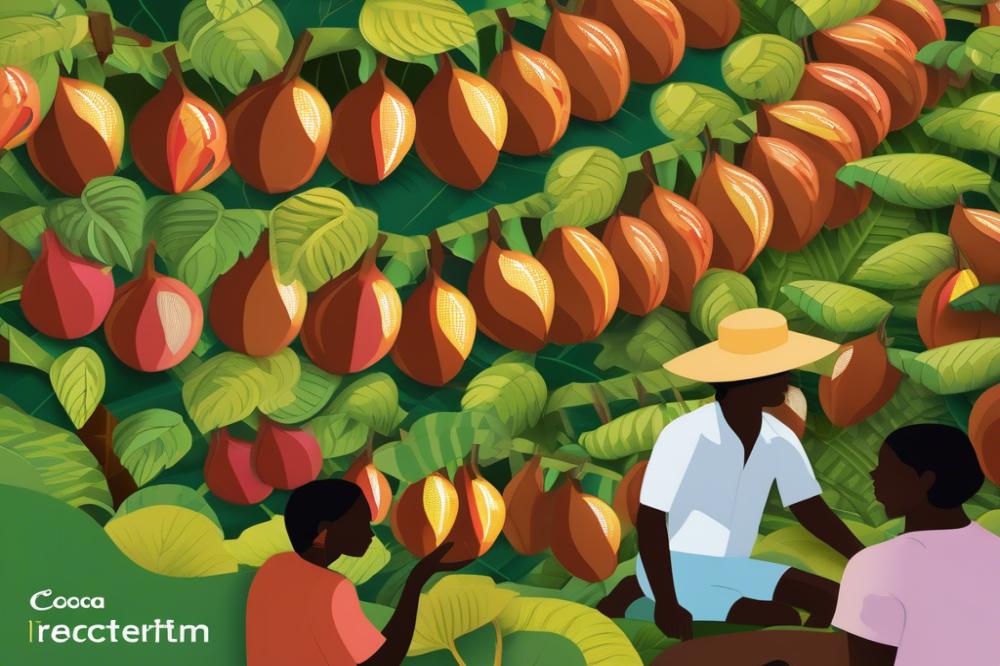Introduction
The chocolate industry is experiencing significant shifts. More consumers now prioritize sustainability and ethical sourcing. They seek products that not only taste good but also contribute positively to the world. As a result, traditional Cocoa Sourcing methods are being called into question. Consumers are demanding greater transparency in supply chains. They want to know where their chocolate comes from and how it impacts cocoa farmers.
Rethinking Cocoa Sourcing has become essential. The issues of fair trade and environmental impact are at the forefront of discussions. Cocoa production is often linked to challenges like deforestation and poor labor practices. Farmers often receive low wages, struggling to support their families. Reforming the way we source cocoa can help alleviate some of these problems.
This is where concepts like Direct Trade come into play. It focuses on establishing direct relationships between farmers and buyers. Such connections can lead to better prices for cocoa farmers, fostering economic empowerment within their communities. By cutting out middlemen, quality assurance improves as well. This direct relationship allows consumers to enjoy premium chocolate while also supporting sustainable practices.
As the chocolate industry evolves, understanding these trends is essential for creating a positive impact. Sustainable practices and ethical sourcing can redefine how chocolate reaches our hands. By shifting our perspective on cocoa sourcing, we can work towards a brighter future for farmers and the environment alike.
Understanding Direct Trade

Direct trade in cocoa sourcing refers to a practice where chocolate makers establish direct connections with cocoa farmers. This method aims to eliminate middlemen who often take a large cut of the profits. Consequently, cocoa farmers receive a fairer price for their harvests. This practice can lead to better financial stability for these farmers.
Comparing this model to traditional trade reveals significant differences. Traditional cocoa trade often involves multiple intermediaries, which can reduce what farmers actually earn. fair trade models strive for better wages and working conditions, but they sometimes lack the personal connection between producers and buyers. Direct trade focuses on building relationships and fostering transparency throughout the supply chain, benefiting everyone involved.
Key principles govern this approach. First, it emphasizes sustainability, which is crucial for the environment. Ethical sourcing practices are also a foundation of this model. Farmers get to participate in decisions that affect their livelihoods. Additionally, there is a commitment to quality assurance, ensuring that high-quality beans reach chocolate makers. Economic empowerment plays a vital role too, giving cocoa farmers the tools they need for growth and success.
In a world where the chocolate industry faces scrutiny over its practices, direct trade offers a more humane alternative. Its emphasis on transparency promotes a sense of trust. There is also a focus on reducing the environmental impact associated with cocoa production. By supporting these farmers directly, buyers contribute to a more ethical and responsible sourcing model.
Benefits of Direct Trade for Cocoa Farmers

Economic empowerment comes hand in hand with direct trade relationships. By connecting directly with buyers, cocoa farmers can negotiate better prices for their beans. This shift places financial power back into the hands of those who grow the cocoa. As a result, farmers are able to invest more in their own communities.
The impact on farmers’ livelihoods cannot be overlooked. With more stable incomes, families can afford necessities like education and healthcare. Improved financial security also leads to reduced poverty levels in rural areas. As farmers gain more control over their pricing, they also find themselves better equipped to face market fluctuations.
Quality assurance becomes a significant benefit for cocoa farmers engaged in these partnerships. When buyers work closely with farmers, they can set standards that elevate the quality of cocoa. Higher quality beans gain a premium price in the chocolate industry. This, in turn, encourages farmers to adopt better farming practices, resulting in richer flavors.
Transparency is crucial in building trust between farmers and buyers. Clear communication about sourcing practices fosters a stronger relationship. Ethical sourcing promotes environmental stewardship, leading to a sustainable future for the cocoa industry. By knowing the origin of their products, consumers are more likely to support these initiatives.
Examples of successful partnerships can be found across the globe. One notable collaboration involves a cooperative in Ghana, where farmers supply directly to a specialty chocolate maker. This partnership has significantly increased the income of participating farmers while enhancing the quality of their cocoa. Another example includes a group in Ecuador, whose focus on sustainability has attracted several international brands, ensuring that environmental issues are addressed.
The Role of Sustainability in Direct Trade

Environmental Impact Considerations in Cocoa Sourcing
Cocoa farming has significant environmental effects. Deforestation, soil degradation, and loss of biodiversity are common issues. Sustainable practices can help limit these problems. By focusing on eco-friendly methods, the chocolate industry can reduce its footprint. Environmental considerations must be at the forefront of sourcing cocoa. Educated choices in sourcing protect both the planet and future generations.
Promoting Sustainable Farming Practices Through Direct Trade
Farmers gain more than just profits from sustainable methods. Economic empowerment is crucial for cocoa farmers who adopt these practices. Tools and training are essential for them to succeed. Learning about agroforestry or organic farming can make a big difference. Sustainable practices lead to healthier crops and a better quality product. Fair trade initiatives often promote these farming practices. Through ethical sourcing, buyers encourage farmers to adopt new techniques and improve their livelihoods.
How Direct Trade Supports Biodiversity and Ecosystem Health
Biodiversity is vital for a balanced ecosystem. A diverse range of plants and animals helps maintain soil health and prevents pests. By choosing sustainable cocoa, companies support these diverse ecosystems. Transparency in the supply chain is key. When buyers know the source, they can make informed choices that protect biodiversity. Farms that use eco-friendly methods often have healthier environments. The benefits extend beyond just cocoa. They support entire ecosystems, ensuring a more sustainable future for all.
Transparency and Supply Chain Innovations
Transparency in cocoa sourcing has become essential in today’s chocolate industry. Consumers increasingly want to know where their chocolate comes from and how it is made. This demand empowers cocoa farmers and encourages ethical sourcing practices. Without transparency, it becomes difficult to hold companies accountable for the treatment of farmers and the environment.
Direct trade enhances traceability within the supply chain. This model allows buyers to connect with farmers directly, creating a clear line from bean to bar. Knowing the source of cocoa aids in ensuring ethical practices are maintained. Farmers can receive better prices for their crops, which leads to economic empowerment in their communities. They also gain recognition for their hard work and commitment to quality assurance.
Technological innovations play a critical role in promoting transparency and efficiency. Mobile apps and blockchain technology help track cocoa from the farm to the final product. These tools allow stakeholders to monitor the supply chain closely. By sharing information across various platforms, companies can improve their sustainability goals. Consumers benefit from knowing that their purchases support fair trade practices.
Efforts to reduce the environmental impact of cocoa farming can also gain momentum with better traceability. Knowing where cocoa comes from allows companies to ensure that sustainable farming methods are used. When farmers follow these practices, the land and communities thrive. Everyone involved, from growers to consumers, has a stake in the health of the planet.
Ethical Sourcing and the Future of the Chocolate Industry
Consumers today care deeply about where their chocolate comes from. Ethical sourcing plays a huge role in this. It also helps strengthen the bond between cocoa farmers and chocolate makers. When farmers receive fair prices for their cocoa, they can invest in their communities. Economic empowerment is vital for lifting many out of poverty. Everyone benefits when farmers thrive.
Direct Trade’s Role in Fostering Ethical Sourcing Practices
One way to achieve ethical sourcing is through direct trade. This approach eliminates middlemen in the supply chain, allowing for better pricing for farmers. It also promotes transparency about how cocoa is traded. Buyers can see exactly where their chocolate originates, which builds trust. By supporting farmers directly, brands can guarantee fair trade practices. This fosters a stronger relationship and a commitment to sustainability.
Challenges and Opportunities for the Chocolate Industry
Despite the benefits, challenges exist in the chocolate industry. Not every company is willing to shift to direct trade models. Some fear the uncertainties it may bring against their existing supply chains. Yet, these challenges also present opportunities. Firms can innovate new ways to connect with farmers. They might also find unique ways to improve the quality assurance of their products.
Future Trends in Cocoa Sourcing and Direct Trade
As awareness of ethical issues grows, so does interest in sustainable practices. The chocolate industry is slowly adapting to new consumer demands. Enhanced transparency will likely become a standard expectation. Moreover, companies may implement stricter guidelines for environmental impact. This transformation could mean better livelihoods for cocoa farmers. By focusing on these ideas, the industry can help create a brighter future. In turn, this can lead to chocolate that is both good for people and the planet.
Final Thoughts on Cocoa Sourcing
The impact of direct cocoa sourcing on the chocolate industry cannot be overstated. This approach transforms how farmers connect with chocolatiers, promoting fairness and higher wages. As relationships strengthen, the benefits extend beyond just profits. Farmers can invest in their communities and focus on better quality beans. This method challenges traditional models and fosters a sense of community that resonates through every bar of chocolate.
When we think about sustainability, we must consider the ethical implications of our choices. Consumers play a crucial role in shaping industry practices. By opting for products sourced directly from growers, buyers help create a system that values people over profit. Supporting fair trade products likewise encourages better practices, ensuring that farmers receive fair compensation for their hard work.
In summary, a shift toward direct trade presents a fascinating opportunity to redefine cocoa sourcing. We must challenge the status quo and demand transparency from brands. Let’s support chocolate companies that take responsibility for their sourcing practices. By doing so, we can contribute to a fairer and more sustainable industry that respects both cocoa farmers and the environment. Together, our choices can ignite change.
So, the next time you reach for a chocolate bar, think about what it represents. Choose wisely, support ethical practices, and inspire others to do the same. Every small action matters in this collective pursuit of a better world for cocoa growers and for ourselves.



